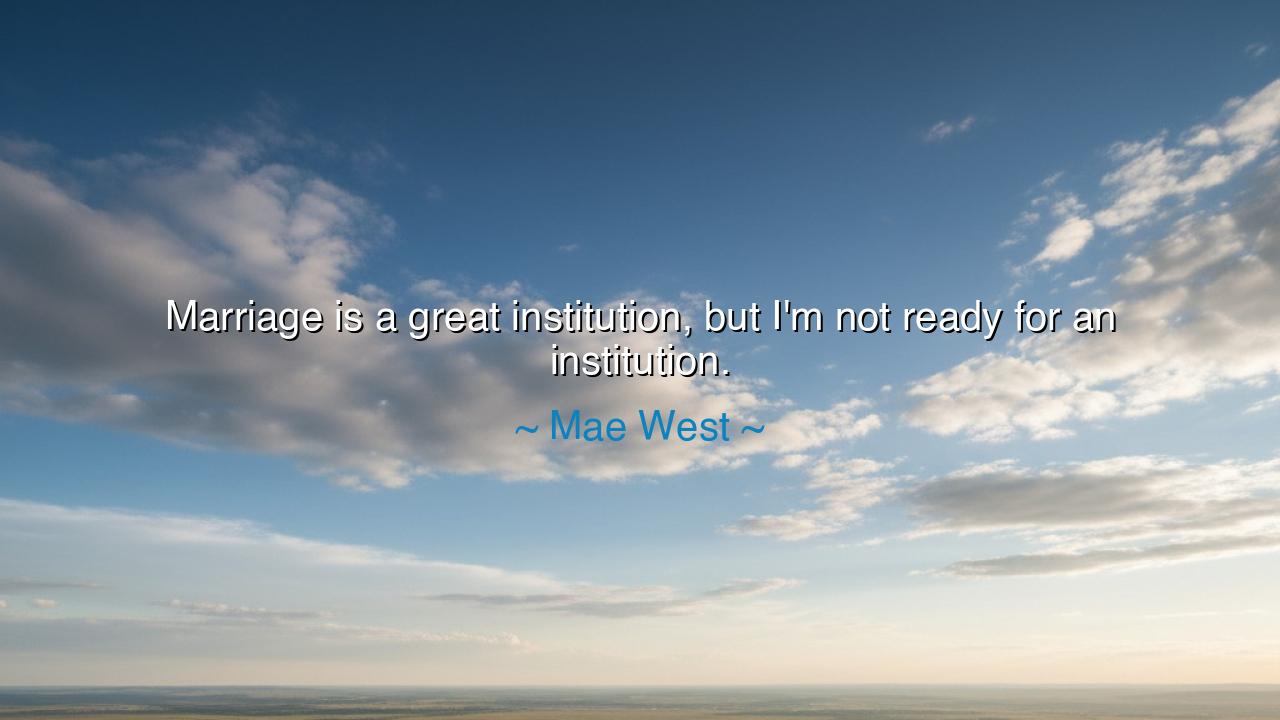
Marriage is a great institution, but I'm not ready for an






In the golden age of wit and rebellion, the legendary Mae West once declared: “Marriage is a great institution, but I’m not ready for an institution.” With a single phrase, she blended humor, defiance, and wisdom into a truth that transcends her time. Beneath the sparkle of her wit lies something far deeper—a reflection on freedom, individuality, and the eternal tension between love and structure. West’s words, though playful, are the confession of a spirit unwilling to be caged, a woman who valued self-sovereignty as dearly as affection.
To the ancients, such a sentiment would not have been foreign. They, too, wrestled with the balance between the bond of union and the freedom of the soul. In every civilization—whether in the temples of Egypt, the forums of Rome, or the academies of Greece—thinkers and poets spoke of marriage as both a sacred union and a potential confinement. It was seen as the cornerstone of order, the root of family, the vessel of legacy. Yet for those whose hearts burned fiercely with independence, marriage could also appear as a chain, a binding that demanded the surrender of self. Mae West, standing in the modern world but echoing ancient wisdom, spoke for those who cherished love yet feared the loss of their freedom within it.
Her words are laced with irony, for she calls marriage a “great institution,” acknowledging its noble purpose—its stability, its beauty, its capacity to nurture life and civilization. But the brilliance of her jest lies in the second half: “I’m not ready for an institution.” Here she twists the meaning, comparing the institution of marriage to another kind of institution—one of confinement, as if matrimony were not merely a bond but a cell. In her humor lies the wisdom of the free soul: that love should elevate, not imprison; that devotion must be chosen daily, not enforced by law or tradition.
Consider, then, the example of Hypatia of Alexandria, the philosopher of late antiquity. She refused marriage, not out of disdain for love, but to preserve her independence of thought and spirit. In her lectures she taught that the pursuit of wisdom requires one’s mind to remain unbound by worldly obligations. Like Mae West centuries later, Hypatia’s defiance was misunderstood by many, yet she remained true to her vision. Both women, though divided by time and culture, carried the same flame—the conviction that freedom and love must coexist, and that a woman’s power lies in her ability to choose her own path.
And yet, West’s quote does not condemn marriage—it merely challenges the way it was often understood in her time. In an age when women were expected to find fulfillment only through marriage, she dared to assert that a woman’s worth could stand on its own. She admired the institution but refused to be confined by it until it could coexist with her freedom. Her laughter was her weapon, and through it she taught that humor can illuminate truth more powerfully than anger. To laugh at the world’s expectations is to loosen their hold upon you.
Her words remind us that every institution, however noble, must evolve with the spirit of the people it serves. Marriage, family, society—all these structures are meant to support human flourishing, not to stifle it. When an institution becomes rigid, when it demands conformity over authenticity, it ceases to uplift and begins to confine. Mae West’s rebellion, then, was not against love, but against stagnation—against any system that forgets the individual hearts it was meant to protect.
Let this, then, be the lesson drawn from her wit: choose love freely, and live authentically within it. Enter no bond out of fear or expectation. Whether in marriage, friendship, or calling, let your commitments spring from joy, not obligation. And remember that humor, when wielded wisely, is a shield against oppression and a torch that lights the path to understanding.
For as Mae West reminds us, freedom and love are not enemies—they are partners in the dance of life. The heart that knows itself can love without fear; the soul that honors its own truth can share that truth without losing it. So laugh, as she did, at the chains the world would place upon you—and live not as one confined to an institution, but as one who walks freely through love’s open gates, unafraid, unbound, and alive.






AAdministratorAdministrator
Welcome, honored guests. Please leave a comment, we will respond soon